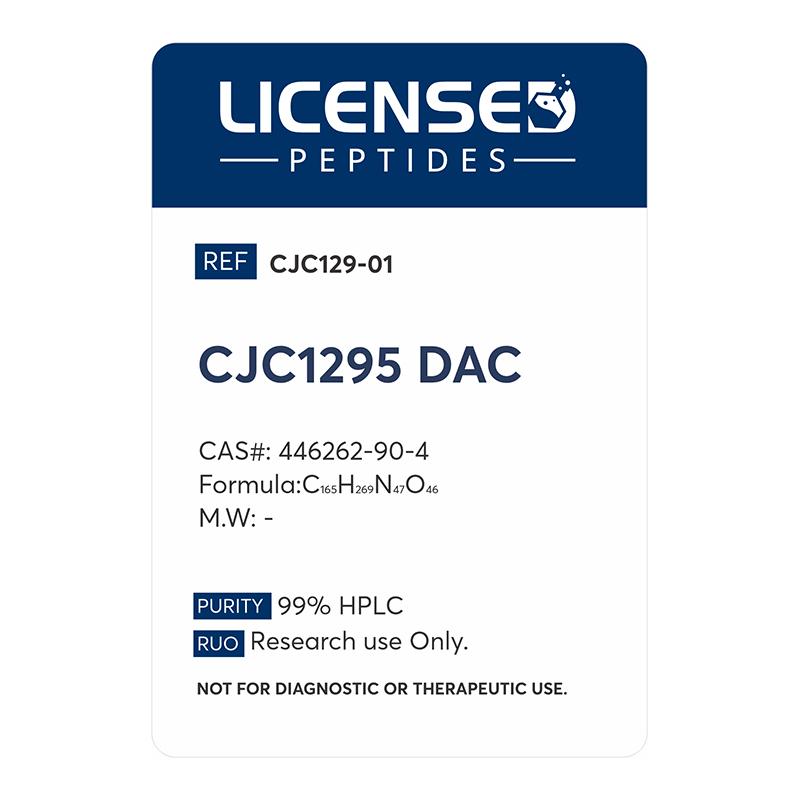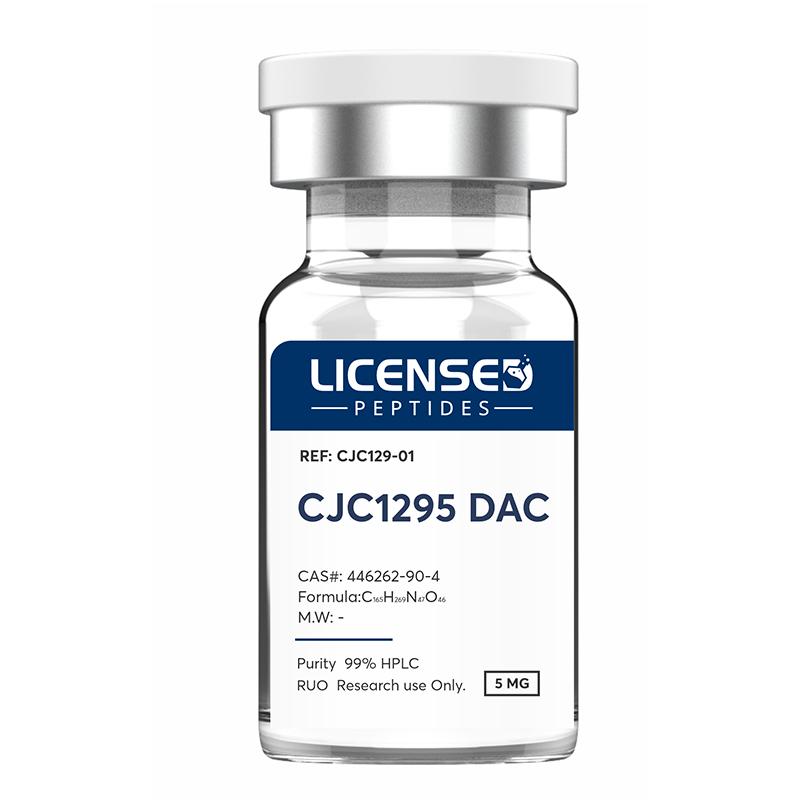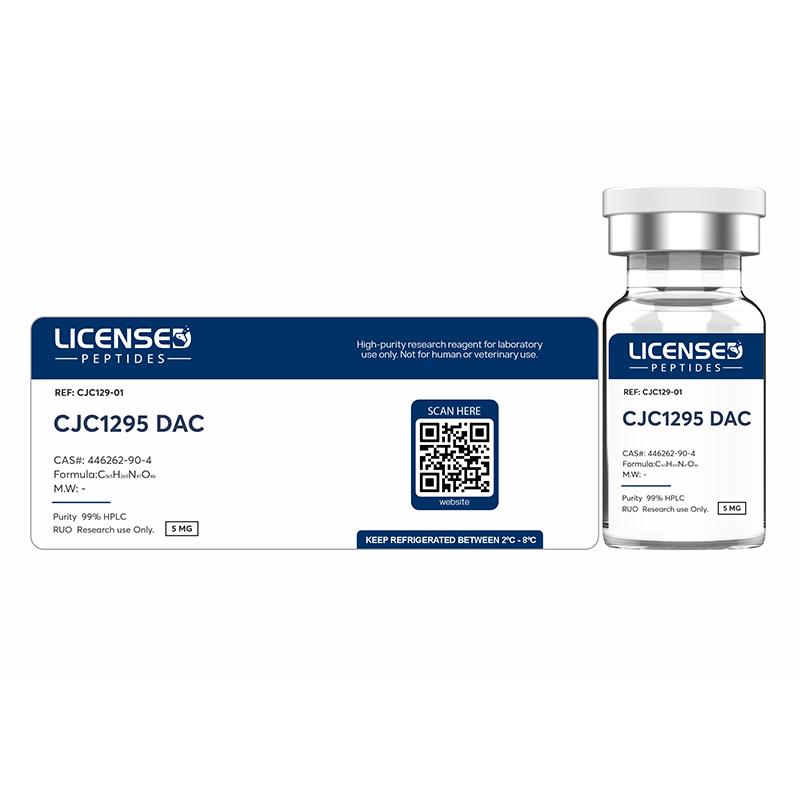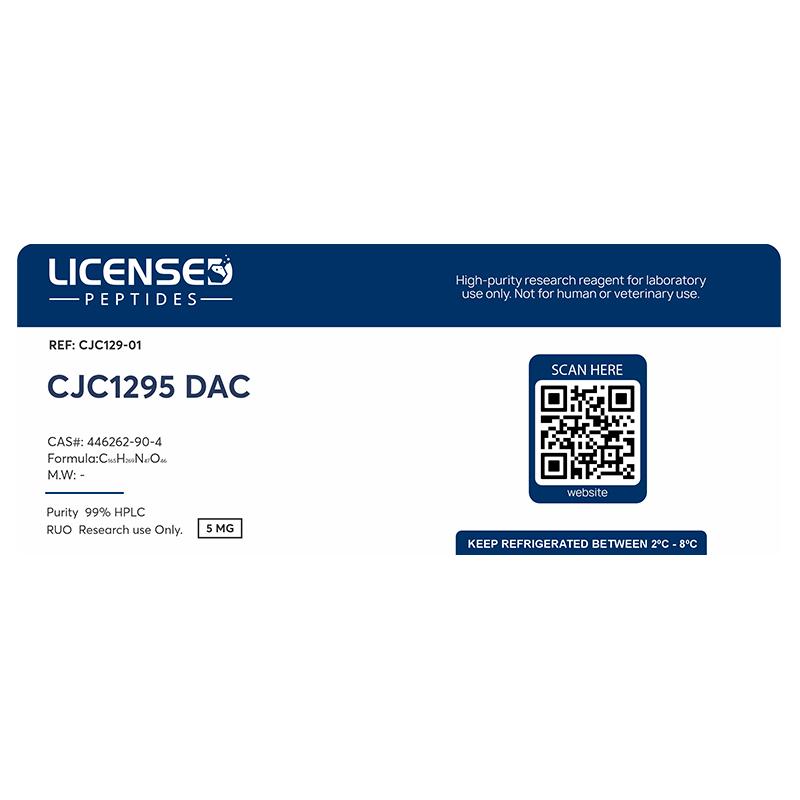CJC-1295 DAC 5mg
$79.99
CJC-1295 DAC is a synthetic peptide designed as an analog of growth hormone–releasing hormone (GHRH). Its primary purpose is to stimulate the pituitary gland to release more growth hormone, which subsequently elevates levels of IGF-1 (insulin-like growth factor 1). What sets the DAC version apart from the non-DAC form is the addition of a “Drug Affinity Complex.” This chemical modification allows CJC-1295 DAC to bind to albumin in the bloodstream, extending its half-life from just minutes to several days. Because of this extended duration, a single administration can keep growth hormone levels elevated for nearly a week, making it significantly more efficient in terms of dosing frequency compared to its short-lived counterpart.
In research contexts, CJC-1295 DAC has been studied for its potential to promote tissue repair, support lean muscle growth, improve fat metabolism, enhance sleep quality, and contribute to overall cellular rejuvenation. These effects are largely connected to the consistent elevation of growth hormone and IGF-1, which play central roles in recovery, metabolism, and anti-aging pathways.
Despite these promising avenues, CJC-1295 DAC remains a research chemical rather than an approved therapeutic drug. Human studies are limited, and while side effects observed have included injection site reactions, water retention, flushing, and tingling, the long-term implications are not yet fully understood. Because of this, its use outside of supervised research carries risks, and it is not approved by regulatory authorities for medical treatment.
$79.99
$79.99
Peptide Capsules
Purchase Peptides
Purchase Blends
Overview
CJC‑1295 DAC (Drug Affinity Complex) is a synthetic analog of growth hormone–releasing hormone (GHRH, specifically the 1‑29 fragment) engineered by ConjuChem to improve pharmacokinetic properties through albumin binding. It leverages a chemical moiety at the C‑terminus that enables prolonged circulation and activity, making it a long‑acting GHRH analog.
In a landmark Phase I clinical investigation by Teichman et al. (2006), two randomized, placebo‑controlled, double‑blind ascending‑dose trials were conducted in healthy adults (aged 21–61). The studies revealed that a single subcutaneous injection of CJC‑1295 DAC induced a dose‑dependent 2‑ to 10‑fold increase in plasma growth hormone (GH) levels lasting approximately 6 days, with mean plasma IGF‑1 levels elevated 1.5‑ to 3‑fold over 9–11 days. Multiple dosing extended IGF‑1 elevation up to 28 days, and the estimated peptide half‑life was 5.8–8.1 days. Notably, no serious adverse events were reported.
CJC-1295 DAC : Structure

Molecular Formula: C165H269N47O46
Molecular Weight: ~3647 g/mol
CAS Number: 863288‑34‑0
PubChem CID: 56841945
CJC-1295 DAC: Research
Prolonged Growth Hormone Stimulation with CJC-1295: A Long-Acting GHRH Analog
This study evaluated the safety, pharmacokinetics, and effects of CJC-1295, a long-acting analog of growth hormone–releasing hormone (GHRH). Unlike native GHRH, which has a short action time, CJC-1295 was designed for extended activity. Two randomized, placebo-controlled trials were conducted with healthy adults aged 21–61 years. Participants received either single ascending doses or multiple weekly/biweekly doses via subcutaneous injection.
Results showed that a single dose of CJC-1295 produced sustained, dose-dependent increases in growth hormone (GH) and insulin-like growth factor I (IGF-I). GH rose 2–10 times above baseline for at least 6 days, while IGF-I increased 1.5–3 times for 9–11 days. The compound’s estimated half-life was 5.8–8.1 days. With repeated dosing, IGF-I levels remained elevated for up to 28 days. Importantly, no serious adverse events were observed, and the treatment was generally well tolerated, especially at 30–60 μg/kg.
Conclusion: CJC-1295 safely provided prolonged stimulation of GH and IGF-I, with evidence of cumulative effects from multiple doses. These findings support its potential as a therapeutic option for conditions requiring GH enhancement.
CJC-1295 & Lipodystrophy
A Phase II clinical trial testing CJC-1295, a long-acting growth hormone–releasing factor (GRF) analog developed by Canadian biotech company ConjuChem, was suspended following the death of a participant. The exact cause of death and any potential link to the study drug (also known as DAC:GRF) is under investigation.
The trial, which had recently finished enrolling 192 patients with HIV-related visceral obesity across multiple sites in North and South America, involved once-weekly subcutaneous injections. Participants were randomized to receive either placebo or escalating doses of CJC-1295 (low-dose: 60–120 μg/kg; high-dose: 60–240 μg/kg) over three weeks, followed by nine additional weeks of treatment.
The company reported that the deceased participant was enrolled at a site in Argentina. Although details remain limited, anecdotal reports suggest the individual was a male patient who died just hours after his 11th injection of CJC-1295.
Referenced Citations
Lipodystrophy study halted after patient death
Sam L. Teichman , Ann Neale , Betty Lawrence , Catherine Gagnon , Jean-Paul Castaigne , Lawrence A. Frohman
ALL ARTICLES AND PRODUCT INFORMATION PROVIDED ON THIS WEBSITE ARE FOR INFORMATIONAL AND EDUCATIONAL PURPOSES ONLY.
The products available on this website are intended solely for in-vitro research purposes (Latin: “in glass”), meaning they are used in experiments conducted outside a living organism. These products are not medicines or drugs, have not been evaluated or approved by the U.S. Food and Drug Administration (FDA), and are not intended to diagnose, treat, cure, or prevent any disease or medical condition. Any administration to humans or animals, whether by ingestion, injection, or other means, is strictly prohibited by law.
Test
Storage Instructions:
All of our products are manufactured using the Lyophilization (Freeze Drying) process, which ensures that our products remain 100% stable for shipping for up to 3-4 months.
Once the peptides are reconstituted (mixed with bacteriostatic water), they must be stored in the fridge to maintain stability. After reconstitution, the peptides will remain stable for up to 30 days.
Lyophilization is a unique dehydration process, also known as cryodesiccation, where the peptides are frozen and then subjected to low pressure. This causes the water in the peptide vial to sublimate directly from solid to gas, leaving behind a stable, crystalline white structure known as lyophilized peptide. The puffy white powder can be stored at room temperature until you’re ready to reconstitute it with bacteriostatic water.
Once peptides have been received, it is imperative that they are kept cold and away from light. If the peptides will be used immediately, or in the next several days, weeks or months, short-term refrigeration under 4C (39F) is generally acceptable. Lyophilized peptides are usually stable at room temperatures for several weeks or more, so if they will be utilized within weeks or months such storage is typically adequate.
However, for longer term storage (several months to years) it is more preferable to store peptides in a freezer at -80C (-112F). When storing peptides for months or even years, freezing is optimal in order to preserve the peptide’s stability.
For further information on proper storage techniques, click the link below:



